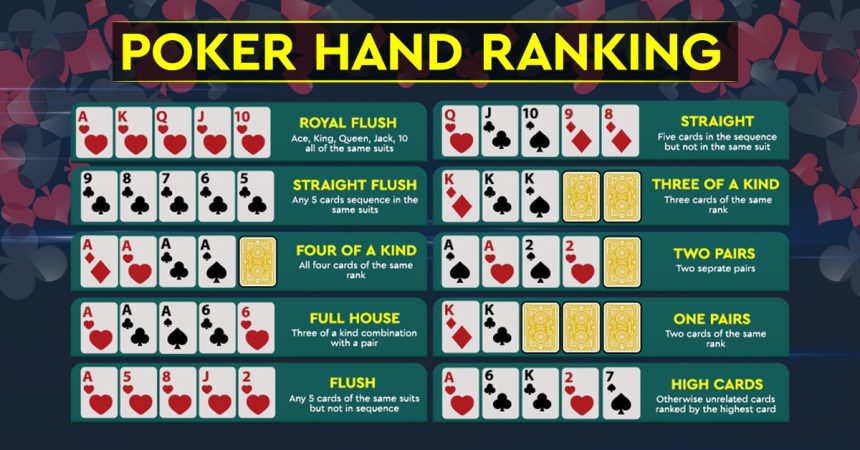Poker is a widely known and played card game across the globe. Poker has a universal appeal that cuts beyond national and cultural boundaries, whether playing in a casino, at home with friends, or online. You’ll need talent and good fortune to succeed in this game.
Origin of the Poker
Poker began in the United States in the 19th century. The game changed from being played with a 20-card deck to a 52-card one before becoming what we know today. The game has advanced, and players have created numerous winning methods.
Poker’s ranks are one of its most essential components. They are crucial to the game because they help players decide whether to wager, call, or fold. Poker rankings can assess a hand’s power compared to other hands. To play poker successfully, you must first understand poker ranks.
Variations in Poker
Various types of poker games are available, but the most popular ones are Texas Hold’em, Omaha, Seven Card Stud, and Five Card Draw. Although each version has special rules, the game’s fundamental ideas remain unchanged. The goal is to create the most substantial hand by using the cards in your hand along with the ones on the table.
For instance, two cards are handed face down to each player in Texas Hold’em and are referred to as the “hole cards.” The players then utilize the five community cards given face up in the centre of the table to form the most substantial five-card hand they can.
In Omaha, each player receives four face-down cards, and five communal cards are placed face-up in the centre of the table. Players are dealt seven cards in Seven Card Stud, and the player with the best five-card hand wins.
Tips for Being a Pro in Playing Poker
Learn the game’s rules: This is just the start of studying the game. It would help if you researched various tactics, strategies, and the game’s psychology to succeed professionally.
Practice makes perfect: As with any other ability, mastering poker requires a lot of practice. To develop your abilities, play as much as possible and try to play against various opponents.
Bankroll management: Managing your money is one of the most crucial components of being a professional poker player. When playing, ensure you have enough cash to cover any losses and adhere to a spending plan.
Keep your composure: As a professional, it is important to maintain composure and adhere to your strategies and plans, even when it may be tempting to become caught up in the excitement of the activity.
Know when to fold: Understanding when to fold is one of the most crucial poker strategies. Don’t let your pride interfere, and be willing to quit if things become complicated.
Manage your emotions: Keeping your emotions in check is essential because poker can be a very emotional game. Don’t let annoyance or rage impair your judgement.
Keep calm: Poker professionals must have patience. Please wait for the appropriate occasion to manifest itself before making decisions.
Keep learning: Even the top athletes worldwide are constantly picking up new and refining existing skills. You can keep abreast of new tactics by reading books, watching videos, and attending seminars.
Stay humble: Finally, always remember to maintain your modesty. Poker professionals put in much effort, devotion, and good fortune. Always be open to learning from your mistakes, and never take your accomplishment for granted.
Poker Rankings
Any player who wants to succeed must comprehend poker rankings, a critical game aspect. The rankings are used to judge a player’s hand’s strength and to decide when to bet, raise, or fold.
The classic high poker hand rankings are the most often utilized poker ranking method. According to this ranking system, the most substantial hand is a royal flush, followed by straight flushes, complete houses, flushes, straights, three-of-a-kind hands, two-pair hands, one-pair hands, and high cards.
A player’s best hand in this system is a royal flush, which comprises an Ace, King, Queen, Jack, and Ten cards of the same suit. The next-best hand is a straight flush with five cards from the same suit placed consecutively. The third-best hand is four of a kind, which consists of four cards of the same rank plus one additional card.
The fourth-best hand is a complete house, which comprises three cards of one rank and two cards of another rank. The fifth-best hand is a flush, which is any five cards from the same suit not dealt in any particular order. The sixth-best hand is straight- any five cards in a row not from the same suit.
In poker, a hand with two cards of the same rank, two more cards of a different rank, and one remaining card is called “two pairs.” A hand with three identical cards and two different cards is called “three of a kind,” which is ranked as the seventh-best hand. The ninth-best hand is a pair, which is made up of two identical cards and three other playing cards. The weakest hand is the high card, any five cards that don’t fit the other requirements.
Understanding poker rankings is crucial to make wise choices during a game of poker. When deciding when to bet, raise, or fold, players who can judge the strength of their hand and the possibility of winning quickly can make better choices. This ability is crucial while competing in tournaments because every hand can significantly affect a player’s chances of winning.
Additionally, it’s critical to remember that not all factors should be considered when making selections, not just poker rankings. Decisions should be based on a player’s position at the table, their opponents’ actions, and the amount of the pot, among other vital considerations.



